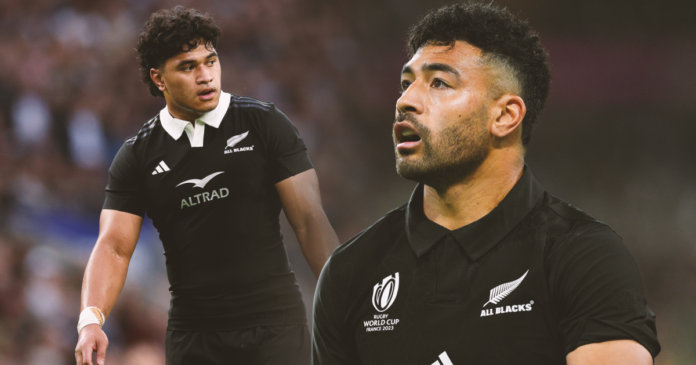
[ad_1]
Time and time again players rise through the New Zealand system out of nowhere and explode onto the world stage.
This time 12 months ago, Wallace Sititi wasn’t on the radar. The Chiefs had smartly signed the blockbusting No 8 away from the Blues, but he had yet to make an appearance in Super Rugby Pacific.
It took until halfway through the 2024 season for Sititi to get a start in the Chiefs crowded back row with All Blacks Samipeni Finau and Luke Jacobson starting.

Since then, Sititi’s life as a rugby player has changed forever in the space of eight months. The 22-year-old was the All Blacks best forward this season and took home World Rugby’s Breakthrough Player of the Year award.
At the beginning of Scott Robertson’s tenure, blindside flanker was one of the biggest positional uncertainties for the All Blacks with Shannon Frizell departing.
It seemed that New Zealand could not find a No 6 after Jerome Kaino until Frizell elevated his game in 2022 and secured the role.
Now, less than year since his departure that hole has been filled by a dynamic ball-carrying force who has been touted as a long-term All Blacks captain. Sititi might be a No 8 long-term, but the system provided an answer that no one saw coming.
Halfback was another pressing need after all-time great Aaron Smith departed for Toyota. After starting the season with TJ Perenara and Finlay Christie, the position was rejuvenated with the younger pair Cortez Ratima and Cam Roigard.
The halfback position is much more certain at the end of 2024 than it was at the start. Roigard and his running game offers something different and Ratima is a strong No 9 with a clean pass. They are clearly the future heading into 2027.
The locks were another key area that needed answers this year after legendary pair Brodie Retallick and Sam Whitelock retired from international play.
The answers were already there, with Scott Barrett already a regular starter in the second row with both aforementioned greats, while Patrick Tuipulotu was expected to assume a greater role within the team.
The player that stood out above all in the position group was Tupou Vaa’i, who through the middle of the year was exceptional. He called the All Blacks lineout plays, operating at near 90 per cent, while having a rounded defensive game with the ability to get over the ball at rucks and defend strongly in close.
After the Springboks series, assistant coach Jason Ryan was prepared to say he was up there as one of the best in the world. Josh Lord and Sam Darry, a debutant this year, aren’t at that level but with time on their side add more depth.
The All Blacks didn’t need to bend the rules for Frizell, as they don’t need to for Richie Mo’unga. The position is not even one of need for the All Blacks.
The third-most capped All Black of all-time in Beauden Barrett is contracted until 2027. In his starts at No 10 in the back end of the season he was in vintage touch.
Against the Wallabies in Wellington at his favoured Cake Tin, he looked good and his attacking kicking game brought another dimension. His best showing was against Italy, who aren’t the doormats they once were. Barrett laid on two try assists and bagged one for himself.
This is a two-time World Rugby Player of the Year who still can play at this level at a world-class standard.
The other No 10 is Damian McKenzie, named in the World Rugby dream 15 this season. There is not a 10 on this planet who has produced more attacking play in Test rugby this season.
He was the All Blacks only spark against England in July, playing error-free rugby while creating New Zealand’s only line breaks and try scoring opportunities.
There is no player with more line break assists in 2024 for club and country as McKenzie, who has 60 (Opta).
His goal kicking has won multiple Tests for the All Blacks this year, despite two late misses in Cape Town against the Springboks. The first England Test in Dunedin, the Sydney Test against the Wallabies and the England Test at Twickenham. He was man-of-the-match against Ireland.
The position is as strong as it has ever been with with two of the best in the world. There is no need to lust after Mo’unga.
There seems to be a rose-tinted view of Mo’unga’s career as an international flyhalf. This was a guy who struggled for years to be consistent until Joe Schmidt arrived as an assistant coach. Until Schmidt arrived, he carved up the lightweights of Test rugby and came up short against the bigger teams.
Mo’unga’s best play in the black jersey came through the back half of 2022 and into 2023 where he became an accomplished international player. It ended with a World Cup final loss and Mo’unga decided to move on to the next chapter. If he wants to come back, great, but the All Blacks do not need him next year or the one after with two world class 10s available.
Since the Breakthrough Player award began in 2015, New Zealand has produced five out of the eight winners. Sititi joins Nehe Milner-Skudder, Rieko Ioane, Will Jordan and Mark Tele’a as All Blacks to have been crowned.
The conveyor belt is still producing some of the best talents the game has seen, there is no reason to change up the eligibility rules for one player.
[ad_2]
Copyright for syndicated content belongs to the linked Source link

